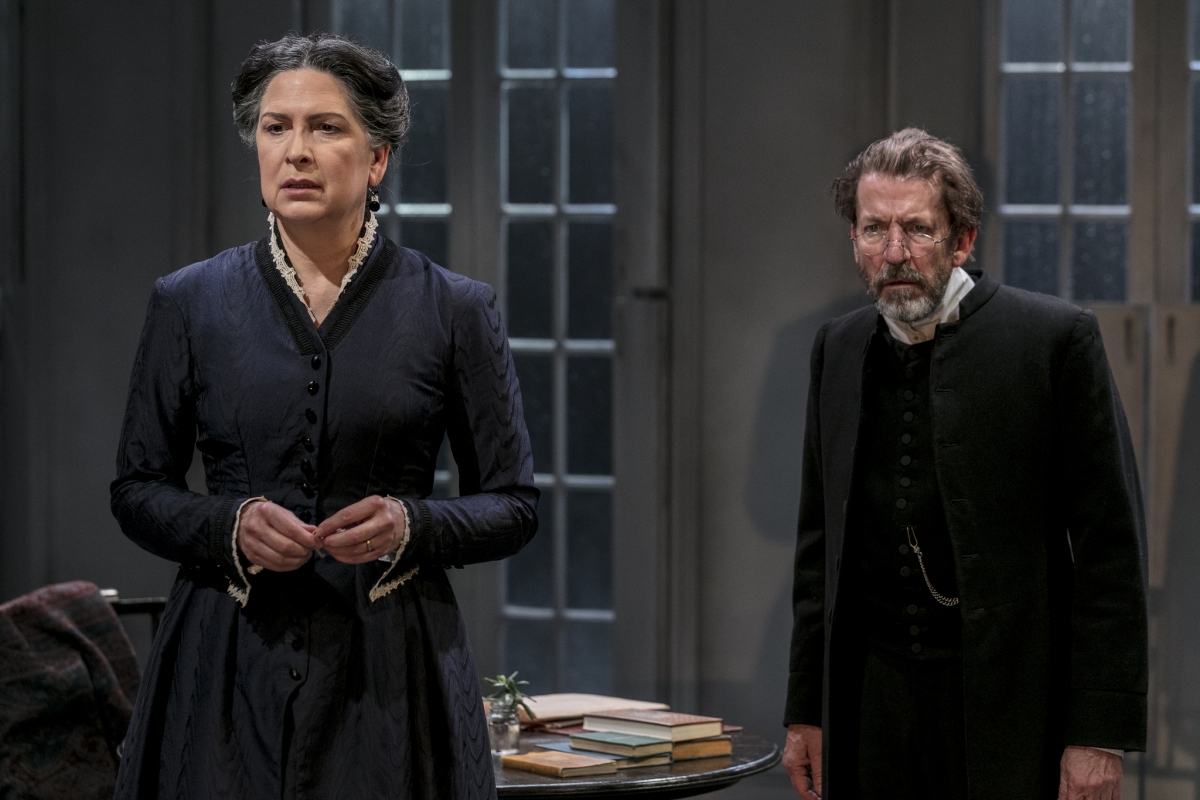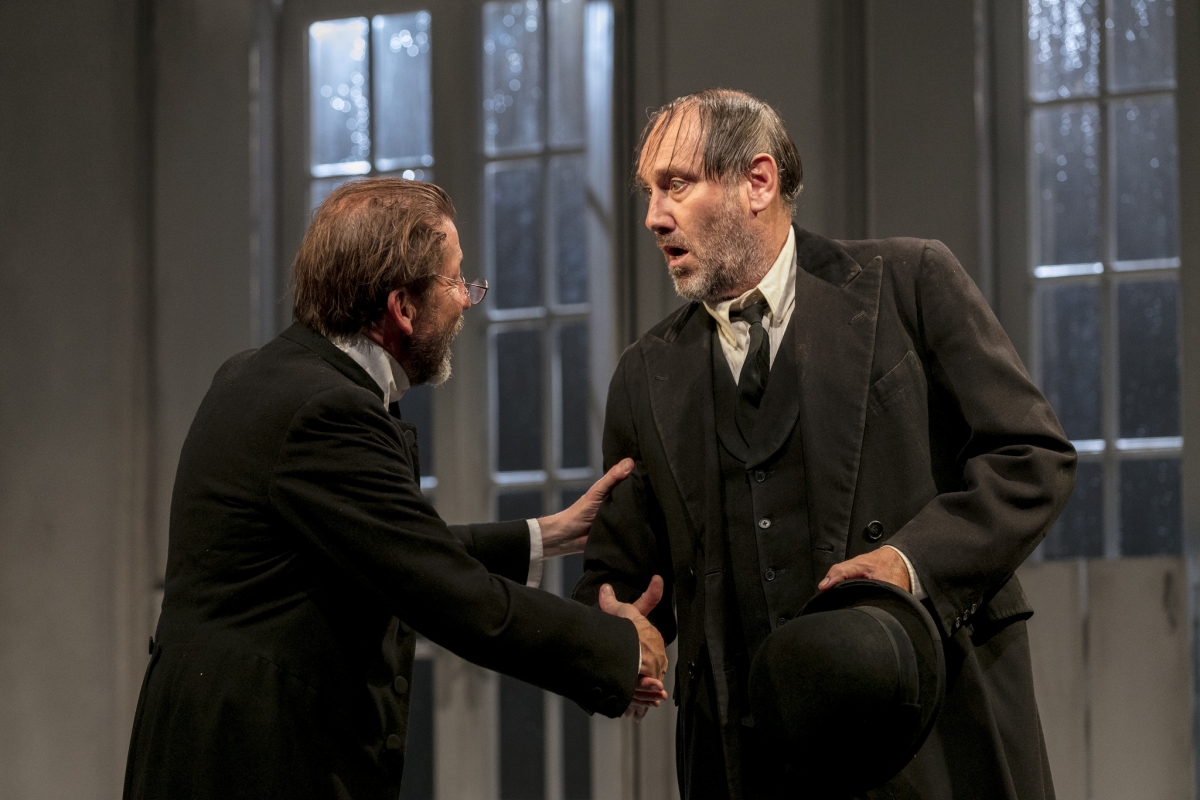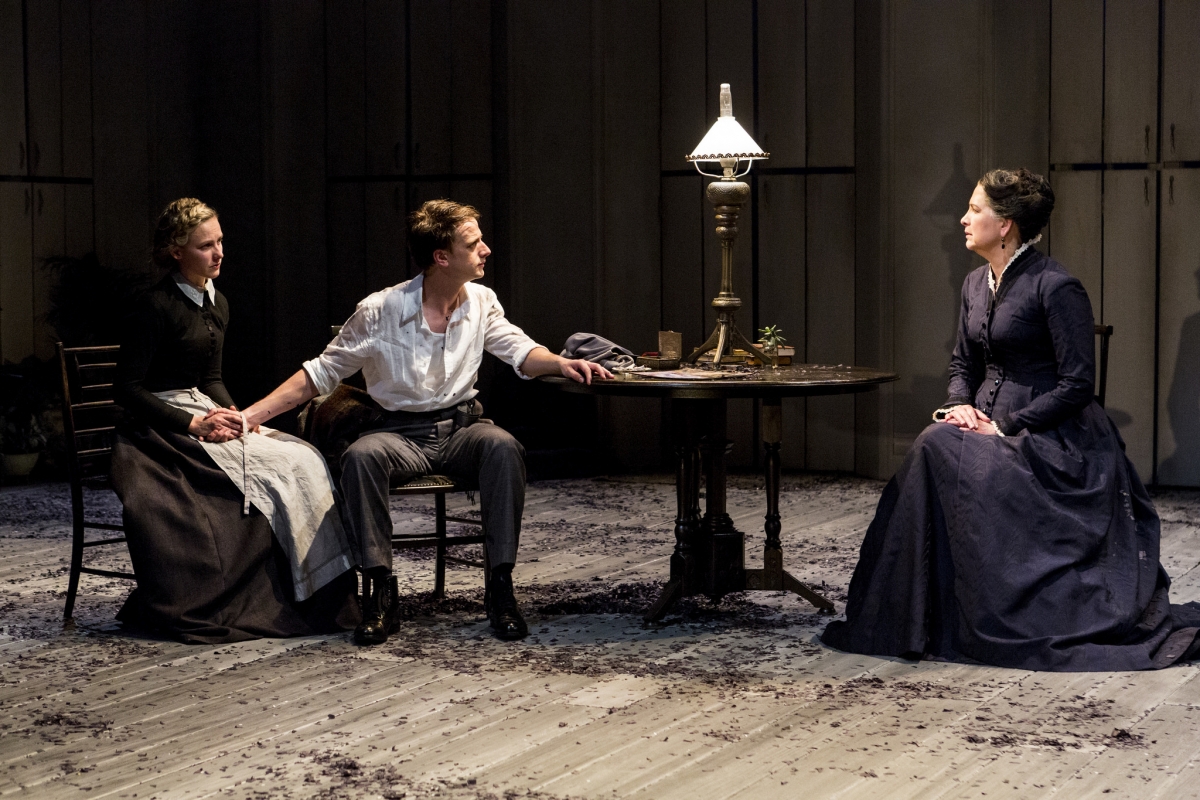“Who are you to demand happiness?” Pastor Manders lectures Mrs Alving in Belvoir’s new production of Henrik Ibsen’s Ghosts. Almost a century and a half on from the 1881 premiere of the Norwegian playwright’s follow-up to his wildly successful A Doll’s House, Ibsen’s self-righteous, hypocritical pastor is all too familiar to contemporary audiences – especially now, against the backdrop of the Australian Marriage Law Postal Survey and the debate that surrounds it.
 Pamela Rabe and Robert Menzies in Belvoir’s Ghosts. Photos © Brett Boardman
Pamela Rabe and Robert Menzies in Belvoir’s Ghosts. Photos © Brett Boardman
While Ghosts will no longer shock audiences the way it did in the 19th century – an oft-quoted review from the English premiere described it as “an open drain; a loathsome sore unbandaged; a dirty act done publicly” – there is still much in the play that speaks to Australian theatre-goers today, particularly in director Eamon Flack’s slick adaptation, based on the literal translation by Charlotte Barslund.
The play centres on three main characters: Mrs Alving (Pamela Rabe), a widow seeking to lay to rest the ghost of her abusive, philandering husband by building an orphanage in his name; Pastor Manders (Robert Menzies) who is facilitating the project; and Mrs Alving’s artist son Osvald (Tom Conroy) who has just returned from Paris. The five-hander is rounded out by Taylor Ferguson as Mrs Alving’s maid Regine and Colin Moody as her dissolute father Jakob.
While Flack doesn’t specifically set Ibsen’s play in 1881, he evokes a memory or suggestion of that era both through Julie Lynch’s sombre period costumes and Michael Hankin’s simple yet beautiful set. The garden room in which the action takes place is all grey timber boards and shutters, through which light – Nick Schlieper’s luminous design – and oppressive weather filter onto the stage, which is lined with potted plants. The sound design by Stefan Gergory and Veronique Bennett is just as sparse – the relentless white noise of rain in the first act contrasts starkly with the silence of the second, both conjuring feelings of claustrophobia and isolation. But while the setting is antique, Flack has updated the dialogue and trimmed the text, giving it a more contemporary, Australian feel while staying true to Ibsen’s narrative.
 Robert Menzies and Colin Moody in Belvoir’s Ghosts
Robert Menzies and Colin Moody in Belvoir’s Ghosts
In a play driven almost entirely by dialogue and a series of devastating reveals, it is the actors who propel the drama. Pamela Rabe’s subtle, nuanced performance is at the heart of this piece, her Mrs Alving a model of dignity and quiet strength as she struggles to free herself from the constraints of the past. Opposite her is Robert Menzies as Manders, who wields the anachronisms of his belief-system with equal parts pomposity and wilful naivety, openly admitting to upholding “ideals” over “truth”. Menzies’ performance places the pastor just this side of doddering and while he is in many ways pitiful – there is not a character on stage who doesn’t see through him – he still wields a significant amount of power in the community. Tom Conroy is both charmingly insouciant and touchingly vulnerable as Osvald, who has returned home to his mother with his own bleak news. Taylor Ferguson is a skittish Regine, wringing a wide-eyed comedy from the awkwardness of her station, while Colin Moody’s Jakob is a wily larrikin, who knows just how to push the good pastor’s buttons to his own ends.
 Taylor Ferguson, Tom Conroy and Pamela Rabe in Belvoir’s Ghosts
Taylor Ferguson, Tom Conroy and Pamela Rabe in Belvoir’s Ghosts
At the heart of this play are conversations that gradually and painfully bring truth to light: the sparring sessions between Mrs Alving and Manders – in which the pastor’s ideas about the duties of a wife clash with the brutal lived experiences of Mrs Alving – the conversations between Manders and Osvald offering opposing views of what constitutes a ‘moral’ family set-up, and finally the heart-rending conversations between mother and son, as it becomes clear that Osvald is falling prey to certain aspects of his father’s legacy despite Mrs Alving’s attempts to shield him from it.
While Flack keeps the tension humming throughout the first two acts, the momentum slips slightly in the third, the pacing – both dramatically and through a final crescendo of light and sound – not quite delivering the emotional punch it could be capable of. Nonetheless, with a brilliant performance by Pamela Rabe at its centre, Flack’s adaptation of Ibsen’s play is poignant and surprisingly timely, reminding us that 136 years on we still have our own ghosts to lay to rest.
Henrik Ibsen’s Ghosts is at Belvoir St Theatre, Sydney, until October 22.











Comments
Log in to join the conversation.